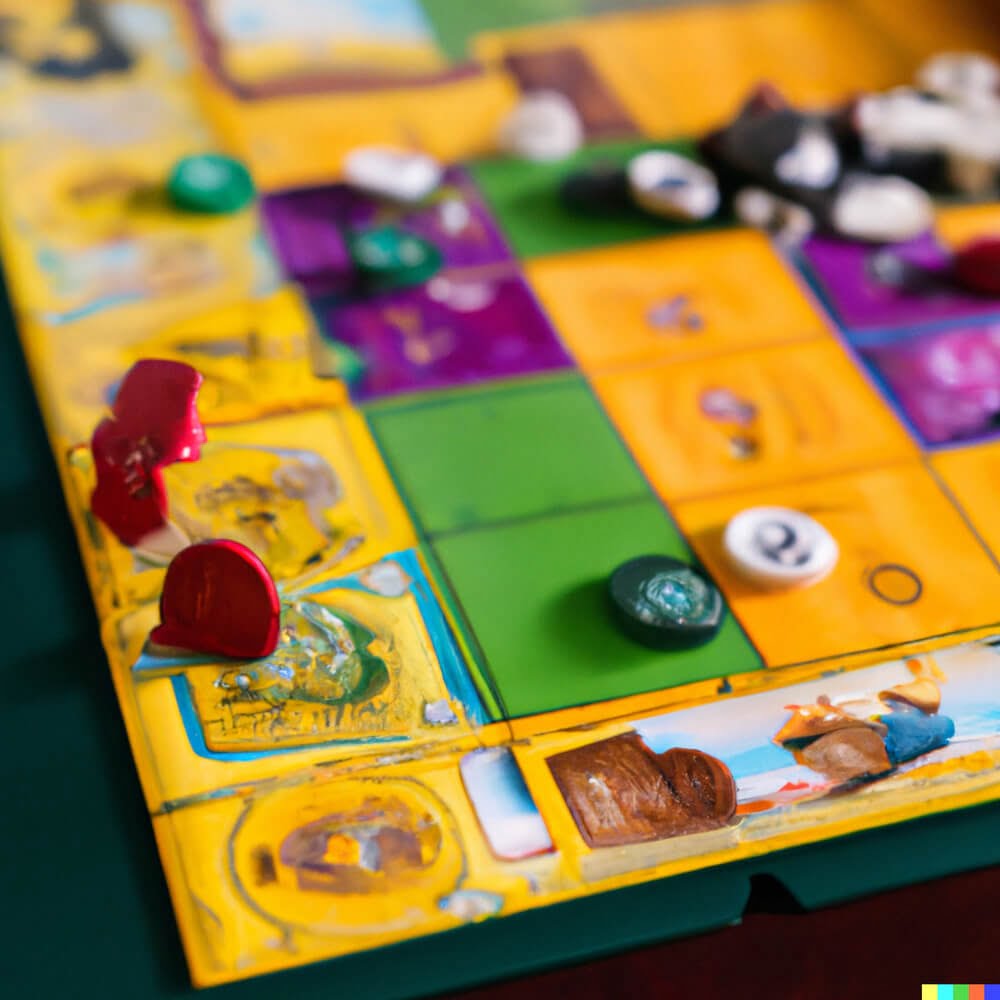Introduction
Board game design is an ever-growing industry, with more designers emerging each year. Board games come in various styles and genres to fit almost any interest, such as educational games, strategy and tactical games, cooperative and co-op games, card games, and dice games. Designers must understand the rules of a variety of game mechanics to effectively create compelling interactive experiences. They also work with a team of people like graphic designers and writers who help bring the board game concept to life.
Board game designer salaries are determined by several factors including experience level, time spent working on projects, complex projects undertaken, and the size of the company or business. Those who have been in the industry for a while and are highly experienced can expect to make significantly more than those just starting out. Generally speaking, independent game designers often earn less than those employed by larger companies or businesses due to their lack of security from future contracts and advances from large publications or sales of licensed content. Nonetheless, experienced board game designers can easily make six figures annually with experience or success within their niche genre or niche market. Additionally, some board game designers with successful titles can make royalties off their intellectual property over a lifetime.
Average Salary Range for Board Game Designers
United States: The average salary range for board game designers in the United States is between $40,000 and $90,000 per year. This range is largely dependent on experience and qualifications; many junior designers start with salaries between $30,000 to $50,000 annually and experienced designers can make up to $150,000 a year.
Canada: The median salary for board game designers employed in Canada ranges from $50,000 to $85,000 annually. Highly experienced professionals can earn well over six figures depending on the company they are with. Entry-level positions typically pay in the region of $35,000 to $45,000 annually.
Europe: Board game design salaries in Europe depend largely upon location and seniority. Junior designers tend to earn an average salary of around ,25,000 – ,38,00 per annum while senior or lead board game designers can often earn upwards of ,60 000 – ,65 000 a year. Salaries can vary greatly by country though; particularly those countries that have strict social labour laws such as Germany where junior design wages are notoriously low compared to other European countries.
Australia: In Australia the average annual wage for board game designers is estimated at around AUD$45 000 – AUD$65 000 depending on experience. Experienced professionals often make significantly more than this range usually starting from around AUD$75 000 per annum while those with strong portfolios and influential board game credits can make over AUD$90 000 annually.
Influential Factors That Impact Board Game Designer Salaries
There are a variety of influential factors that can affect the salary of a board game designer. One of the most important is experience. Generally, experienced board game developers who have several successful titles to their name will earn higher wages than those with little-to-no professional experience. The size, complexity, and popularity of the project they are working on may also affect their salary. Other factors that can impact their pay might include the location in which they live and work, the type of company or industry where they are employed, and even whether or not there is an existing demand for their specific skill set. Additionally, many board game designers are paid based on an hourly rate or commission structure instead of receiving a flat salary due to the nature of their work. Ultimately, when attempting to determine what a board game designer’s salary might be it is best to consider all factors that could potentially have an effect on their earning potential.
Pros and Cons of Working as a Board Game Designer
Pros:
• Potential for significant financial gain: Board game designers often make a higher salary than many other professions and can potentially see significant financial upside if their game ideas become popular or commercially successful.
• Flexible working schedule: While board game designs often require long hours, much of the work can be done from home when it suits the designer’s schedule and lifestyle.
• Creative freedom: As a board game designer, you have considerable control over the look, feel, and rules of the games you design. This offer an incredible amount of creative freedom that few other jobs can offer.
Cons:
• Unpredictable income: The nature of the board game industry means that paychecks can be highly variable and unpredictable due to changing tastes in gaming.
• Pressure to develop new ideas: Come up with a winning concept quickly as this field is very competitive with others wanting to do prosper in the same area.
• Limited career progression paths: While you can progress to become a lead designer, there are limited opportunities for advancement since most jobs are on a project by project basis.
How to Land That Lucrative Board Game Design Job
Board game design has become an increasingly popular and competitive field in recent years. The salary for board game designers is highly variable, depending on many factors such as experience, the type of work, and the sector of the market you design for. A quick online search will show(you) that there are several different opportunities available for designers of all levels.
When applying to board game design jobs, it’s important that you showcase your unique skills and experiences and demonstrate why you should be considered over other applicants. Many employers value creativity and collaboration; therefore, outlining projects or pitch ideas can be very useful when creating a portfolio to show potential employers. Networking is also a key factor in finding a successful job as a board game designer. One way to stay up to date on current trends and accomplishments within the industry is through attending conventions that are dedicated to tabletop gaming and meeting with other professionals interested in gaming. With some perseverance and effort, you can join the ranks of working board game designers with great earning potential!
Training Opportunities for Aspiring Board Game Designers
Most aspiring board game designers view becoming a successful professional as a dream job. A career in this field comes with a great salary and can be incredibly rewarding. However, many people who want to pursue a career in board game design lack the necessary training opportunities in order to make their dream into a reality.
Thankfully, there are options available for those looking to get the skills necessary for designing one-of-a-kind board games. Seminars, workshops, and online courses can provide board game designers with the knowledge they need to take the next step towards success. Online courses that focus on topics like game mechanics, inventing new rules, branding & marketing strategies are all great places to start when honing your skills. Attending meetups or conferences dedicated to board games is also an excellent way to network and learn from others who have already experienced success in the industry. Additionally, getting hands-on experience by creating basic prototypes of your own ideas no matter how simple will allow for growth and improvement over time.
Another way to gain experience is by interning at a company that creates physical or digital products related to the production aspect of game making; such as graphic design or coding. Ultimately gaining paid experience before venturing out on your own can provide invaluable insights into how professionals create quality content that engages customers while also conveying their vision accurately and efficiently. On average board game designers make anywhere between $50k – $200k USD per year depending on various factors such as expertise, contract status with publishers and total annual sales of designed games produced over an entire year period; making it more important than ever for aspiring designers to take advantage of any available educational resources..
Tools and Resources for Developing Board Games
The average salary for a board game designer is highly dependent on where one works, but generally falls between $50,000 and $90,000. Those just starting out in the field may be paid lower salaries of about $35,000 to account for their lack of experience. Salaries can be significantly higher for those entering competitive development positions.
When it comes to developing board games, there are several tools available to designers which include various open source projects such as tabletop simulator and online publishing services like Game Crafter and The Game Kastle which aid in the development process. Additionally, software tools such as Tabletop Constructor allow for the mechanistic elements of game design. Social media platforms like BoardGameGeek provide connections with other game developers while using crowdfunding sites like Kickstarter help bring a project to life by providing resources necessary for early production steps. Finally, there are more traditional artisanal printing companies who can provide assistance with designing board game components and boxes. All these tools, when utilized properly and in conjunction with peer reviews through playtests can create a strong prototype design suitable for production or sale.
Interviews with Established Board Game Designers
The average salary of an established board game designer is difficult to accurately estimate. Many top designers don’t disclose their exact income, making it even harder to get an accurate idea of their pay. However, there are a few anonymous interviews available from prominent board game designers that give some insight into how much they earn.
One designer reported earning around $104,000 for one specific board game”an impressively high sum for a single project. Meanwhile, another reported working on two projects simultaneously and receiving revenue shares from both, though the exact amounts were not specified. Other reports suggest that freelancers may command as much as $500 per hour for consulting but typically receive no additional royalties from any commercialized versions of their work. Lastly, many prominent designers stated that they receive periodic royalty payments throughout the year, which can vary greatly depending on the success of their games in the marketplace.
In addition to these reported salaries, many board game design firms have incentives beyond financial compensation that attract top talent. Those may include holding conferences or seminars at major events dedicated to gaming or incentivizing employees with future royalty payments on successful projects they develop in-house. Additionally, some firms guarantee long-term contracts with competitive rates and bonuses based on performance indicators such as project completions and designs sold commercially. The existence of such perks gives promising designers greater security and peace of mind when choosing a career path in the ever-evolving gaming industry.
A Comprehensive Guide to Board Game Designer Salaries
Board Game Designer salaries vary depending on a variety of factors, such as experience, location, and the size of their employer. Most board game designers are employed by either larger production companies or independent software developers. A board game designer with more than five years of experience may make an average salary of $80,000 to $100,000 a year. Those working for smaller firms may make less than that; however, in most cases they will still be awarded additional benefits such as flexible hours and access to some exciting projects.
On the other hand, independent game designer salaries tend to depend primarily on the success and popularity of their games. A successfully released game can pay dividends for an indie developer over many months or even years; potential bonuses can range from several hundred dollars up to tens of thousands depending on how well it is received by players. Board game designers who work for small companies may also receive royalties if their games generate enough sales.
When looking into board game design jobs, it’s important to consider both wage and benefit packages when negotiating salary as part of a job offer. For instance, many production companies provide competitive health insurance coverage, vacation time options, and tuition reimbursement plans in addition to competitive base wages. Additionally, many board gaming studios provide team-building activities that help promote creative thinking in design conversations among colleagues and company partners. This kind of extra-curricular activity could potentially increase overall earnings if successful collaborative projects result from them.
Ultimately, the right career path for any individual depends on their goals and needs; someone with no prior gamification experience might seek entry-level positions while seasoned veterans might opt instead for freelance contracts with multiple clients or consultation services that maximize their value-added impact at every juncture. Whatever route they decide is best fits them financially they stand to greatly benefit from honing their skillset within this ever-evolving industry segment – which promises countless more opportunities in the years ahead!

I love playing all kinds of games – from classics like Monopoly to modern favourites like Ticket to Ride.
I created this blog as a way to share my love of board games with others, and provide information on the latest releases and news in the industry.




